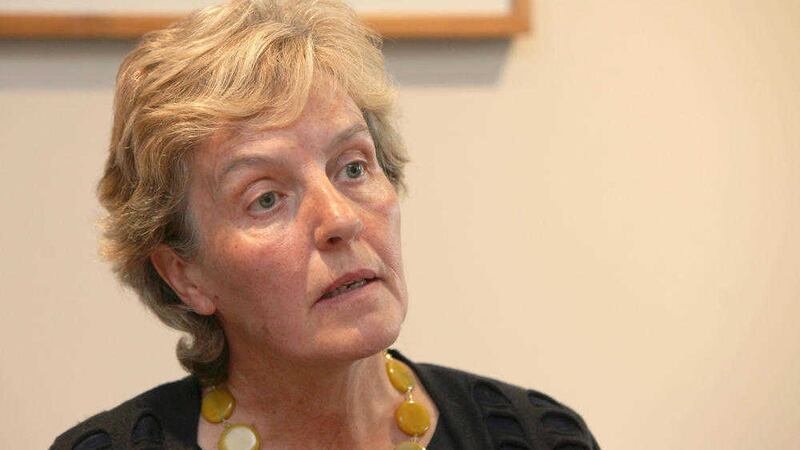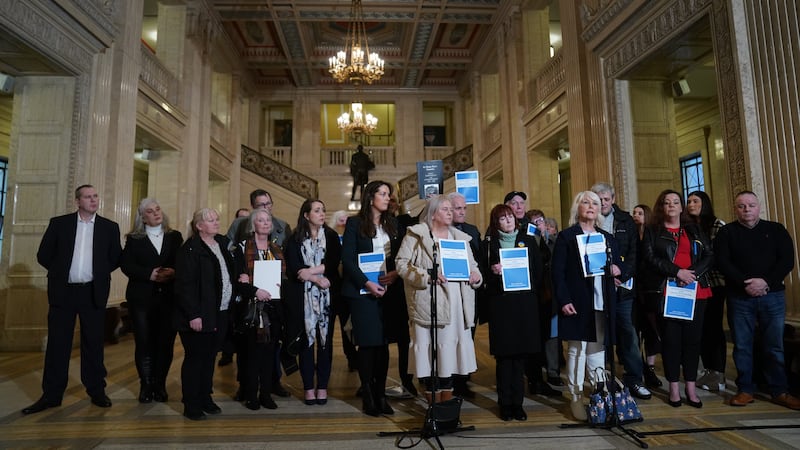MORE than eight out of 10 people sent to prison in Northern Ireland are there for less than a year.
In the criminal justice system it's known, despairingly, as `revolving door syndrome' - because it is more likely than not they will be back.
Such short sentences may `fit the crime' but they give little time for the kind of rehabilitation work which might help prevent further offending.
Indeed some offenders are known to factor `jail time' into their lifestyle, weighing up time spent behind bars against the proceeds of crime, likening it to leaving the family to work on oil rigs.
The merry-go-round of offending and short sentencing comes at a price for society - in loss and distress to victims as well as policing, prison and court costs - and for a long time has seemed one of those insurmountable features of the criminal justice system.
However, the frustrated judiciary, before whom these serial offenders return again and again, have demanded action.
Lord Chief Justice Sir Declan Morgan met acting Director of Probation Cheryl Lamont and deputy director Paul Doran last year to ask the service to look at increasing `community sentencing' for offenders whose crimes attract custodial terms of 12 months or less.
That conversation led to the creation of Enhanced Combination Orders (ECO), which has yielded some extraordinary results.
Among the group in question, half offend again within a year and 30 per cent on ordinary supervision orders will be back before the courts for a second offence.
However, for those handed ECOs the figure has fallen to less than 20 per cent.
Ms Lamont said ECOs are so named because they provide a combination of both a community order (such as community service) and a supervision order.
"For serious offences there has to be a prison sentence - for public confidence there has to be an acknowledgement that harm has been done," she said.
However, for probation, sentencing is all about the impact as a deterrent.
"That's why we exist - to stop people from re-offending. We exist to put ourselves out of work."
Mr Doran laid out the sobering statistics.
"A thousand people are sent to custody in Northern Ireland every year - 85 per cent for less than 12 months. The Home Office in England uses the phrase, `It is an expensive way of making bad people worse' because of the costs across the system," he said.
"£60,000 a year is the cost of a prison sentence. That is paying a lot of money for sentences which don't have a detrimental effect.
"Seventy-four per cent of those being handled by the service have a drug or alcohol problem, 37 per cent have a mental health issue."
Ms Lamont agrees: "Very often when people come out of prison they'll very quickly revert to old habits of alcohol abuse and drug abuse."
The 18-month pilot scheme, which began in October, has several elements including "a huge emphasis on rehabilitation", said Mr Doran.
"Everything about this order is to help the person move away from re-offending, although there is an element of retribution, or rather reparation, making good for the harm that has been done."
Here the concept of restorative justice hoves onto the landscape again.
Victims are offered the option of meeting offenders to express how they have been affected by the crime.
Meanwhile, strenuous efforts are made to ensure that the community service fits the crime, so where the charge is one of, say, animal cruelty, the offender will be expected to do some work in an animal shelter, or the burglary of a GAA hall, will see them volunteering at a different club and so on.
"A lot of the people we work with have had challenging life experiences," Mr Doran said.
"There will be domestic violence or substance abuse. Every single person on an Enhanced Combination Order will have a mental health assessment by a mental health expert.
"A lot of people we work with are people that society want to forget about and have been rejected by society."
This was an issue, he said, that was highlighted by the Lord Chief Justice.
"It's not a silver bullet of course... but out of 59 people (on the pilot) only nine have reoffended and all those offences have been different and less serious offences (than the ones) for which they got the combination order."
The two pilot areas were in Ards and Newry & Armagh.
Of the 59 cases, four offenders were taken back to court for not complying with the order and three were sent to prison.
Ms Lamont said the supervision part of the regime aims to be an improvement on prison.
"We're trying to have a better outcome. The lifestyle of these individuals in prison would be sitting in the prison regime waiting to be released. We expect them to have a constructive lifestyle."
Mr Doran added: "Employment is a huge issue for the people we work with. One of the key tasks is to work with voluntary organisations to make people able to take up any employment or training options.
"The early stages of an order are critical times when things can go wrong. The `in-work' element is done in a more concentrated fashion.
"We encourage them to start as soon as possible after the order is made and we have a number of examples where people have continued to work in the place as a volunteer."
The pilot has had the backing of the Department of Justice (DoJ) as well as the judiciary, with Anthony Harbinson, director of the department's 'Safer Communities' unit, praising its success in "diverting offenders from short term prison sentences to robust and effective community sentences".
"There is a need for innovation and creativity within criminal justice and this is certainly a creative approach which has the potential to prevent re-offending, enhance rehabilitation and make communities safer."
However, like all innovations, it will require the shifting of resources in a sector where each distinct area has traditionally been known to tenaciously hold on to as much of its piece of the pie as possible.
The orders cost between £5,000-6,000 - just a tenth of the bill of jailing an offender for a year.
Ms Lamont and Mr Doran are confident that, if properly and comprehensively rolled out, it will save police, prison service and the courts money.
----------------------
MICHAEL'S STORY
Michael (not his real name) was sentenced in October 2015 to an Enhanced Combination Order for drug offences.
As part of that order he is being supervised by a probation officer for 18 months and must carry out 100 hours of unpaid community service.
Michael has been using drugs since he was 16 years old and since that time has been convicted of several offences.
In his own words he tells how he ended up within the criminal justice system:
"I didn't have a very good childhood and a lot of my behaviour stemmed from witnessing abuse among family members.
"I was 12 years old when I turned to drugs to escape. At this stage my school work suffered, I started hanging around with the wrong people and getting into trouble. Selling drugs seemed like an easy way to make money.
"I tried on occasions to change my lifestyle but it was difficult. I had short spells in prison but in 2015, having been sentenced to four months in custody, I made a decision that I wanted to change my life.
"From the start of the Enhanced Combination Order I got support and I wanted to take the opportunity to make a positive change in my life.
"I attended the community addiction team as part of the order and through that got the motivation to stay off drugs.
"I also worked with Barnardos and that really gave me a better understanding of how my kids feel and helped me take responsibility for my actions."
Michael also completed some restorative work and said that helped him understand ‘his actions were about more than just me, there were victims’.
After six months being supervised by probation, Michael said: "Probation has changed my life by signposting me to the right services.
"I know I can lift the phone now and get help and support and that in turn, has helped me be more positive about my life. Probation has helped me manage my problems .”
Since starting this order Michael has completed all his community service, and fully complied with his order.
His probation officer believes his future is much brighter.








